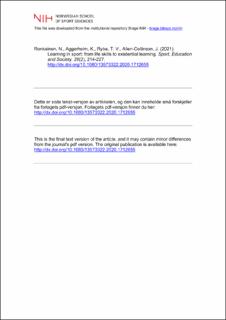| dc.contributor.author | Ronkainen, Noora | |
| dc.contributor.author | Aggerholm, Kenneth | |
| dc.contributor.author | Ryba, Tatiana V. | |
| dc.contributor.author | Allen-Collinson, Jacquelyn | |
| dc.date.accessioned | 2021-08-04T07:20:05Z | |
| dc.date.available | 2021-08-04T07:20:05Z | |
| dc.date.created | 2020-01-09T20:25:08Z | |
| dc.date.issued | 2020 | |
| dc.identifier.citation | Sport, Education and Society. 2020, 26(2), 214-227. | en_US |
| dc.identifier.issn | 1357-3322 | |
| dc.identifier.uri | https://hdl.handle.net/11250/2766086 | |
| dc.description | Dette er siste tekst-versjon av artikkelen, og den kan inneholde små forskjeller fra forlagets pdf-versjon. Forlagets pdf-versjon finner du her: https://doi.org/doi.org/10.1080/13573322.2020.1712655 / This is the final text version of the article, and it may contain minor differences from the journal's pdf version. The original publication is available here: https://doi.org/doi.org/10.1080/13573322.2020.1712655 | en_US |
| dc.description.abstract | Youth sport is habitually promoted as an important context for learning that contributes to a person’s broader development beyond sport-specific skills. A growing body of research in this area has operated within a life skills discourse that focuses on useful, positive and decontextualised skills in the production of successful and adaptive citizens. In this paper, we argue that the ideological discourse of life skills, underpinned by ideas about sport-based positive youth development, has unduly narrowed the research on learning in sport to only what is deemed functional, teachable, and economically productive. After considering the problems associated with the currently dominant life skills approach, we explore existential learning as an alternative perspective on conceptualising and studying learning in sport. An existential approach provides a non-instrumental theory of learning with an emphasis on discontinuity, relational self and ‘becoming’, opening an avenue for exploring various forms of informal learning under-explored in sport. We discuss the applications of this alternative approach for future research and practice in learning in youth sport. | en_US |
| dc.language.iso | eng | en_US |
| dc.subject | positive youth development | en_US |
| dc.subject | athletes | en_US |
| dc.subject | discontinuity | en_US |
| dc.subject | informal learning | en_US |
| dc.subject | identity | en_US |
| dc.title | Learning in sport: From life skills to existential learning | en_US |
| dc.type | Peer reviewed | en_US |
| dc.type | Journal article | en_US |
| dc.description.version | acceptedVersion | en_US |
| dc.source.pagenumber | 214-227 | en_US |
| dc.source.volume | 26 | en_US |
| dc.source.journal | Sport, Education and Society | en_US |
| dc.source.issue | 2 | en_US |
| dc.identifier.doi | 10.1080/13573322.2020.1712655 | |
| dc.identifier.cristin | 1769853 | |
| dc.description.localcode | Institutt for lærerutdanning og friluftslivsstudier / Department of Teacher Education and Outdoor Studies | en_US |
| cristin.ispublished | true | |
| cristin.fulltext | postprint | |
| cristin.qualitycode | 2 | |
